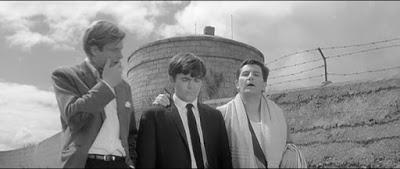Format: Internet video on laptop.

I don’t claim to be a genius, but it’s a rare film where I don’t have something to say. It’s entirely possible that what I have to say might be completely insipid, of course, but at least I’m bringing something to the table. A few times a year, though, I get a film like Ulysses where, at the end, I have no idea what to say and no idea where to start. And yet, here we go; the film is watched and on the Oscar list, so I’m more or less committed.
I should probably come completely clean at the top on this as well. Despite the fact that I have a degree in English literature I can’t really call myself a huge fan of the work of James Joyce. I’m not opposed to Joyce; I just haven’t read a great deal of his work. Ulysses is based on his book of the same name, so while I know the book by reputation, I’m essentially going into this completely cold.
The easiest way to put this is to break it down to its very basics. Ulysses is the story of a single day in Dublin as seen through the eyes of three different people. Those people are Leopold Bloom (Milo O’Shea), his wife Molly (Barbara Jefford), and Stephen Dedalus (Maurice Roeves). A great deal of the story involves their relationships with other people and with each other and a great deal of their past, particularly that of the Blooms.
So here’s more or less what you need to know. Leopold is a Jew born and raised in virtually all Catholic Ireland. Eleven years previous, his only son died, and since that time he has been impotent. He is keenly aware that he is Jewish and that virtually everyone he knows is not. Stephen, a poet and school teacher, is currently torn apart by guilt at the death of his mother. This is in no small part because a number of people blame him openly for causing her death by not being willing to pray for her. Molly Bloom, thanks to her husband’s impotence, is a serial adulterer, and while having an affair with a boxing promoter, believes that soon enough she will start an affair with Stephen Dedalus.
And, really, that’s pretty much it. A great deal of the film takes place inside the heads of the various people, giving the film a sort of stream of consciousness feel throughout the running time. This is particularly true of Leopold, who has Walter Mitty-like fantasies the put him on trial, making him the Lord Mayor of Dublin, and any number of other things.
Since I haven’t read the book, I don’t really know how accurate the film is, but I’m well aware that a great deal of the book is written in stream of consciousness form. It seems oddly sterile, though, and that’s never been a criticism I’ve heard leveled at Joyce’s work in general. The fact that the film spends a massive amount of time dealing with sex overtly. It wouldn’t shock me if Ulysses was banned in a number of places. Remember, this was released in 1967, and we have Molly Bloom talking about giving guys blowjobs. That seems a little bit beyond for the era in which the film was made.
The middle of the film comes across as someone having a dissociative episode, and that makes it difficult to follow. We’re suddenly watching Leopold Bloom being harangued by women accusing him of sexual crimes, and it seems to come out of nowhere. It might well make a great deal more sense to someone who is familiar with Joyce’s novel, but for the rest of us, it just happens. This is a common theme, and it makes the film difficult to follow and uncomfortable to watch. This is not because it’s embarrassing or shocking, but because it feels nonsensical. Again, that might not be the case for someone who knows the book.
The truth is that about midway through the movie, I wondered what the hell I was doing watching it. I did manage to get to the end and through the long stream of consciousness section of Molly Bloom talking about her various affairs and dreaming of cock (her words, not mine) until the damn thing ended. I was happy when it did end, and I’m still wondering why I watched it other than it being a checkmark in a box.
The biggest, most damning problem I can think of with Ulysses is that after seeing it, I have absolutely no desire to look into Joyce’s book. That’s a shame, because it’s considered one of the masterpieces of English literature from the past century. Yes, that speaks poorly for the film adaptation. I can’t help that because it’s the truth.
Why to watch Ulysses: It’s classic literature?
Why not to watch: It seems entirely pointless.
